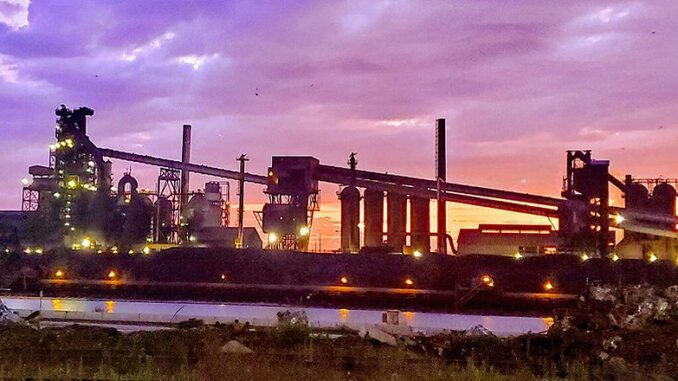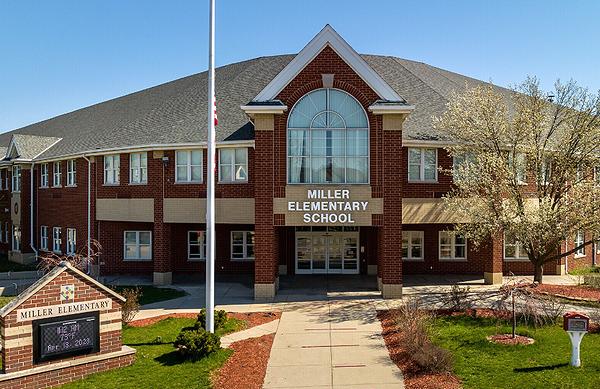
DEARBORN, Michigan, October 23, 2023 (ENS) – Two federal agencies are modifying a 2015 legal agreement the United States and State of Michigan made with AK Steel to resolve Clean Air Act violations at the company’s Dearborn plant.
The original agreement between AK Steel and the Justice Department and Environmental Protection Agency required the Dearborn plant to eliminate visible air emissions coming from the plant, but the measures taken failed to bring the plant into compliance with the Clean Air Act.
The Dearborn steel mill was bought three years ago by the Cleveland-Cliffs Steel Corporation, the largest flat‑rolled steelmaker in North America.
The modification now requires Cleveland-Cliffs to undertake additional extensive measures expected to reduce visible emissions from the Dearborn plant at a cost of over $100 million.
The modification requires replacement of the plant’s electrostatic precipitator, ESP, equipment that removes particles from a gas stream using electrical energy. It removes particulate matter from the exhaust gases generated by the plant’s operations and so controls visible emissions.
It also requires routine testing of the new ESP to assure compliance with applicable emission limits, operational parameters, and regular monitoring for visible emissions.
“The agreement will ensure that Cleveland-Cliffs’ steel manufacturing plant in Dearborn operates in compliance with federal and state air pollution requirements,” said Assistant Attorney General Todd Kim of the Justice Department’s Environment and Natural Resources Division. “This modification will result in better air quality for Dearborn residents around the plant, who have been disproportionately burdened by pollution.”

The neighborhoods surrounding the plant are occupied by low-income residents of color and immigrants. English is spoken in 26 percent of the homes there, while Arabic is spoken in 71 percent of Dearborn homes, according to the EPA.
There are two elementary schools within two miles of the Dearborn steel works, and residents complain that their homes, yards and the school grounds are often covered with black soot from the steel plant.
In addition to the plant improvements, Cleveland-Cliffs must implement a state-law supplemental environmental project through which nearby residents will receive home air purifiers, at a total estimated cost to the company of $244,000.
Under the modification, the actions required of Cleveland-Cliffs are expected to “curtail” emissions of manganese and lead. Inhalation of manganese can cause negative health effects, including impacts to the human central nervous system, reproductive system and lungs, according to the U.S. Agency for Toxic Substances, ASTDR.

The most common health problems in workers exposed to high levels of manganese involve the nervous system, including behavioral changes and “movements that may become slow and clumsy,” the ASTDR says on its website.
Inhalation of lead has been linked to harmful impacts on kidney function, and on the immune, cardiovascular, reproductive and developmental systems in humans.
In anticipation of the modification agreement, Cleveland-Cliffs has already performed much of the required work, the federal officials said.
“Today’s announcement shows that EPA and the Department of Justice are committed to achieving cleaner air for communities across the country,” said Assistant Administrator David Uhlmann of the EPA’s Office of Enforcement and Compliance Assurance. “The changes that Cleveland Cliffs will make at its Dearborn facility will reduce harmful air pollution and improve air quality for local residents.”
The company also will pay a civil penalty of $81,380 to the state of Michigan for violating the state permit’s opacity, lead and manganese limits.
Ohio-based Cleveland-Cliffs Inc., formerly Cliffs Natural Resources, specializes in the mining and pelletizing of iron ore, as well as steelmaking, including stamping and tooling. It is the largest flat-rolled steel producer in North America.
The Cleveland Cliffs Dearborn Works steel plant began operating in 1920. It currently produces steel products primarily for the automotive and construction industries. Originally owned by the Ford Motor Co.’s Rouge manufacturing complex, it was bought by Russian steel company Severstal, which invested $1.2 billion into the plant in retrofitting efforts in 2007 and 2001. The plant was acquired by AK Steel in 2014 for $707 million. In 2020, Ohio-based Cleveland-Cliffs bought the plant.
The company operates fully-integrated steel mills and finishing facilities in Kentucky, Indiana, Illinois, Ohio, Michigan, Pennsylvania, West Virginia, and North Carolina. Its annual production capacity amounts to 23 million net tons of raw steel.
There will be a 30-day public comment period on the proposed modification. The modification and instructions on how to submit a public comment is available here on the U.S. Justice Department website.
Featured image: Cleveland-Cliffs Dearborn Works steel plant at sunrise. May 27, 2021. (Photo by Alan Etoll via Facebook)
© 2023, Environment News Service. All rights reserved. Content may be quoted only with proper attribution and a direct link to the original article. Full reproduction is prohibited.



